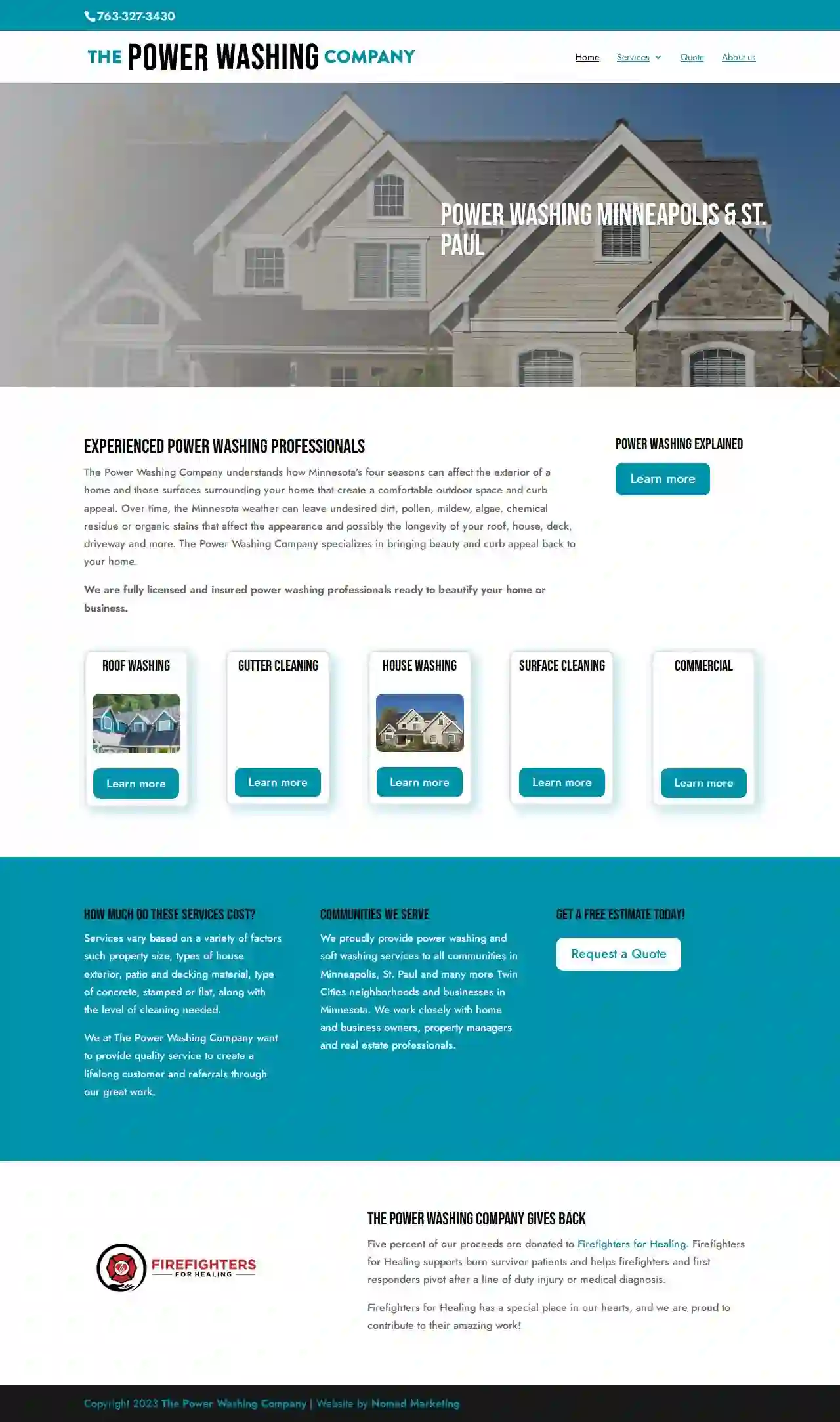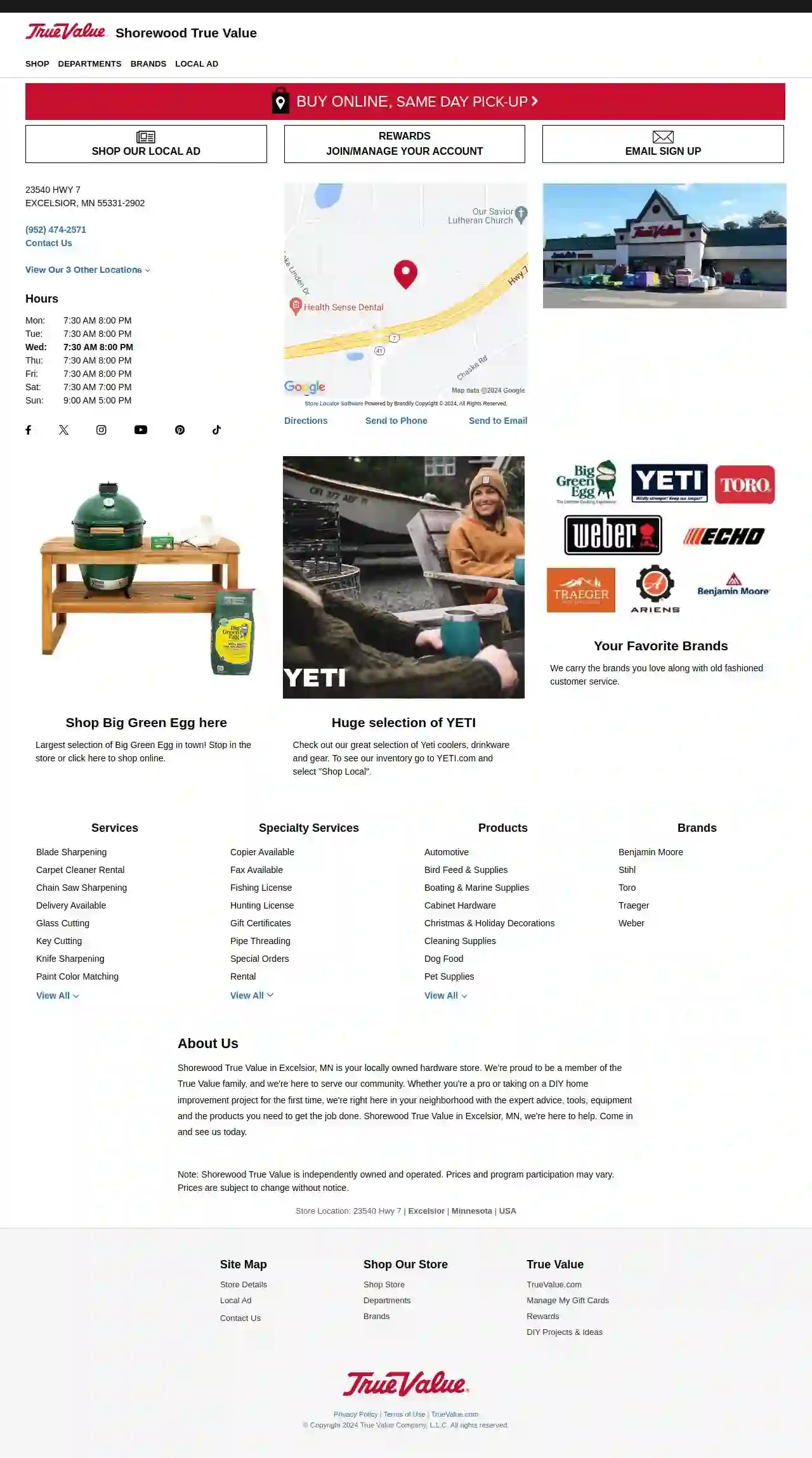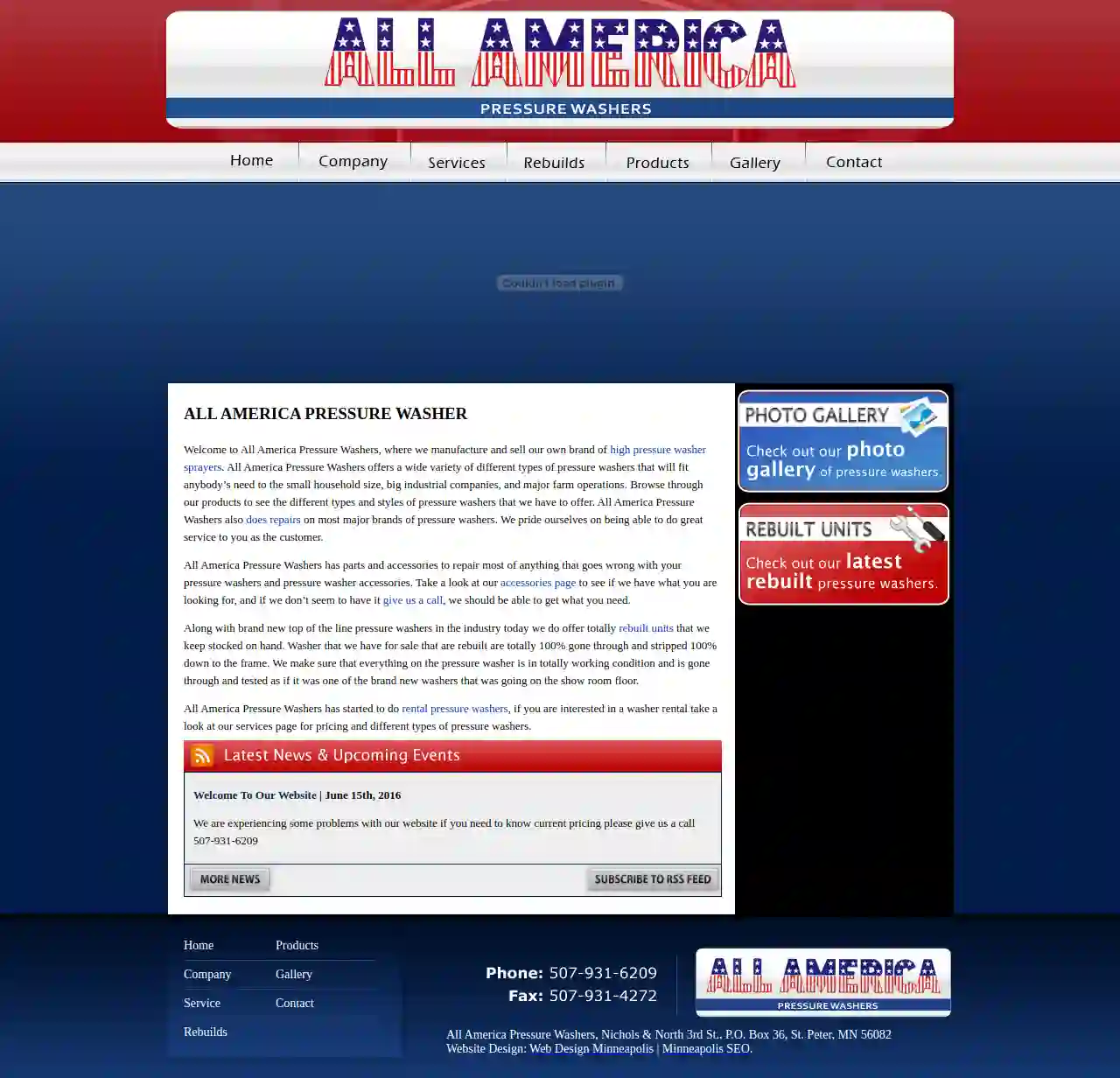Pressure Washing Baxter
Best Exterior Cleaning in Baxter
Get up to 3 Commercial Pressure Washing quotes for your project today! Compare profiles, reviews, accreditations, portfolio, etc... and choose the best service.

Wash Masters
5146 reviews427 Meadow Rose Court, Delano, 55328, USWash Masters is a family-owned and operated professional window and pressure washing company serving the western suburbs of Minneapolis and the greater Twin Cities area. Established in Delano, MN, they pride themselves on providing a superior and professional service that is second to none. They offer a variety of services including window washing (interior and exterior), pressure washing for various hard surfaces, gutter cleaning, and even Christmas light installation. Wash Masters is committed to 100% customer satisfaction, offering competitive pricing and bonded and insured services.
- Services
- Why Us?
- Our Team
- Testimonials
- Gallery
Get Quote
Roc Services
11 reviewsWest Henrietta, NY, 92 Candleford Heights, Rochester, 14586, USRoc Services is a premier Pittsford pressure washer founded in 2015 by owner Maria Monclus. With 22 years of experience in the industry, Maria is committed to providing personalized services to our clients while delivering world-class results with our products and services. Our mission is to exceed our clients' expectations, and we promise to charge them only after they are completely satisfied with our work. We take pride in using the latest pressure washer technology and techniques to ensure the best possible results, all while providing friendly and professional customer service.
- Services
- Why Us?
- Accreditations
- Our Team
- Testimonials
- Gallery
Get Quote
RTD Power Washing
4.315 reviews365 Webster Street, St. Paul, 55102, USRTD Power Washing is a Twin Cities based company specializing in Fleet Washing, Heavy Duty Equipment Cleaning, and Commercial Property power washing. We've been serving Minnesota since 1995 and are committed to providing high-quality service while protecting the environment. Our professionally trained staff utilizes the latest equipment and techniques to ensure your fleet or building looks its best. We stand behind our work 100% and offer a satisfaction guarantee. RTD Power Washing is certified by the Power Washers of North America (PWNA) and was the first in Minnesota to earn Water Reclaimer certification. This means we are held to the highest industry standards. We strive to build long-term relationships with our customers based on trust and exceptional service.
- Services
- Why Us?
- Accreditations
- Testimonials
- Gallery
Get Quote
Top Hat Services - Your Exterior Cleaning Experts
4.9436 reviews7635 W 148th Street, #257, 7635 W 148th Street #257, Apple Valley, 55124, USWe all know how harsh Minnesota weather can be. Having temperature changes of nearly 60 degrees from day to day can be anything but good for the exterior of your home. With that being said, we have made it our mission to give your home or business that one of a kind curb appeal that everybody will talk about. With two locations in Apple Valley, Minnesota and Farmington, Minnesota we are proudly servicing residential homes, townhomes/apartment complexes, and small commercial buildings in the entire South Metro Area. Professional services include window cleaning, house washing, pressure washing, roof washing, and gutter cleaning services. Our experienced, licensed, and insured team of professionals will leave your property looking so fresh and so clean that your home will be the talk of the neighborhood! Whether you’re wanting a routine Spring, Summer and Fall cleaning, having a grad party, hosting an event or just simply looking for that one of a kind curb appeal... we are the ones for the job.
- Services
- Why Us?
- Testimonials
- Gallery
Get Quote
The Power Washing Company
544 reviews123 Main St, Suite 100, Minneapolis, 55421, USThe Power Washing Company is a fully licensed and insured power washing professional dedicated to bringing beauty and curb appeal back to homes and businesses in Minneapolis, St. Paul, and surrounding areas. They specialize in power washing, soft washing, roof washing, gutter cleaning, house washing, patio and deck cleaning, and surface cleaning. Their services are tailored to meet the needs of each property, considering factors such as size, exterior type, and level of cleaning required. The company is committed to providing quality service and supports Firefighters for Healing by donating 5% of their proceeds.
- Services
- Why Us?
- Accreditations
- Our Team
- Testimonials
- Gallery
Get Quote
L&G Pressure Washing
524 reviewsRochester, USL&G Pressure Washing is a locally owned and operated business serving the Greater Rochester area. We are dedicated to providing high-quality pressure washing services to both residential and commercial clients. Our team is committed to delivering exceptional customer service and exceeding your expectations. We understand that your property is an important investment, and we take pride in helping you maintain its value and curb appeal. At L&G Pressure Washing, we utilize the latest equipment and techniques to ensure a thorough and effective cleaning. Our 5-step pressure washing procedure is designed to remove dirt, grime, mold, mildew, and other contaminants from a variety of surfaces. We also offer a range of other services, including gutter cleaning, graffiti removal, and deck washing. We are committed to providing our customers with: Clear communication On-time service Free quotes Online booking Fair pricing Multiple services Contact us today to schedule a free consultation and learn more about how we can help you keep your property looking its best.
- Services
- Why Us?
- Gallery
Get Quote
Air Force Pressure Wash
57 reviewsRochester, USAir Force Pressure Wash is a female and veteran-owned and operated business, established with the goal of delivering military-grade promptness and attention to detail. We pride ourselves on providing exceptional customer service, ensuring we are always on time, reliable, and meticulous. Our mission is to exceed your expectations for all your residential and commercial pressure washing needs. We strive to earn your continued support, as well as that of your neighbors and friends.
- Services
- Why Us?
- Gallery
Get Quote
H2Eco Pressure Washers
524 reviewsRochester, USWelcome to H2Eco Pressure Washers, your go-to source for top-quality, trusted, eco-friendly pressure washing services. Our team of experienced professionals is dedicated to providing exceptional service and delivering outstanding results. Using biodegradable chemicals and environmentally safe practices, your property and your assets are treated as if they were our own. We strive to be in constant communication with our customers until the job is done and after. Please contact us to set up your pressure washing service or with any questions on our services. We look forward to working with you! H2Eco Pressure Washers, LLC Established 2019 Rochester, NY (585)734-6774
- Services
- Why Us?
- Our Team
- Testimonials
- Gallery
Get Quote
Shorewood True Value
4.678 reviews23540 Hwy 7, Excelsior, MN, 55331-2902, USShorewood True Value in Excelsior, MN is your locally owned hardware store. We're proud to be a member of the True Value family, and we're here to serve our community. Whether you're a pro or taking on a DIY home improvement project for the first time, we're right here in your neighborhood with the expert advice, tools, equipment and the products you need to get the job done. Shorewood True Value in Excelsior, MN, we're here to help. Come in and see us today.
- Services
- Why Us?
- Accreditations
- Our Team
- Testimonials
- Gallery
Get Quote
All America Pressure Washers
4.611 reviewsP.O. Box 36, St. Peter, MN, Nichols & North 3rd St., 56082, USAll America Pressure Washers is a company that specializes in manufacturing and selling high-pressure washer sprayers. They offer a variety of pressure washers suitable for different needs, from small household sizes to big industrial companies and major farm operations. The company also provides repair services for most major brands of pressure washers and offers parts and accessories to fix any issues. Additionally, they sell totally rebuilt units that are thoroughly inspected and tested to ensure they are in working condition. All America Pressure Washers also offers rental pressure washers and has a gallery page showcasing their products and services.
- Services
- Why Us?
- Accreditations
- Our Team
- Testimonials
- Gallery
Get Quote
Over 60,241+ Janitorial Services on our platform
Our janitorial services operate in Baxter and beyond!
CleaningMatch has curated and vetted Top Janitorial Services near Baxter. Find a trustworthy pro today.
Frequently Asked Questions About Pressure Washing
- Online Reviews: Check online reviews on platforms like Google, Yelp, and Facebook to gauge customer satisfaction and service quality.
- Experience and Expertise: Look for companies with a proven track record and experience in pressure washing various surfaces.
- Licensing and Insurance: Ensure the company is licensed and insured to protect you from liability in case of accidents or damage.
- Equipment and Techniques: Inquire about the company's equipment and techniques to ensure they use appropriate pressure levels and cleaning solutions for different surfaces.
- Quotes and Pricing: Obtain detailed quotes from multiple pressure washing companies and compare their pricing. Make sure the quotes are transparent, outlining all services and costs.
- Professionalism and Communication: Choose a company that is responsive, provides clear communication, and demonstrates professionalism in its interactions.
- Using Excessive Pressure: High-pressure water spray can damage delicate surfaces like wood siding or painted surfaces.
- Using the Wrong Nozzle: Different nozzles produce different spray patterns and pressure levels. Using the wrong nozzle can cause streaks, uneven cleaning, or damage.
- Holding the Nozzle Too Close to the Surface: Holding the nozzle too close can etch or damage the surface. Maintain a safe distance as recommended by the pressure washer manufacturer.
- Skipping Pre-Treatment: For stubborn stains or mold growth, pre-treating the surface with a cleaning solution can enhance cleaning effectiveness.
- Not Protecting Plants and Landscaping: Pressure washing chemicals and debris can harm plants and landscaping. Cover or shield sensitive areas before pressure washing.
- Size of the Area: Larger areas generally cost more to pressure wash than smaller ones.
- Type of Surface: Different surfaces require different pressure levels and cleaning solutions, which can affect pricing.
- Condition of the Surface: Heavily soiled or stained surfaces may require more time and effort to clean, impacting cost.
- Accessibility: Difficult-to-reach areas may require specialized equipment and increase costs.
- Additional Services: Services like pre-treating stains, applying protective coatings, or mold removal may incur additional charges.
- Hard Surfaces: Pressure washing is often successful in removing graffiti from hard surfaces like brick, concrete, or metal.
- Delicate Surfaces: For delicate surfaces like wood or painted surfaces, a gentler approach using specialized graffiti removal products and techniques may be necessary.
- Professional Graffiti Removal: For stubborn or extensive graffiti, consider hiring a professional graffiti removal service. They have specialized equipment, cleaning solutions, and experience in dealing with various types of graffiti.
How do I find a good pressure washing service?
Utilize online directories like CleaningMatch to find and compare qualified pressure washing services in your area.
What are some common pressure washing mistakes to avoid?
If you're unsure about pressure washing techniques or the appropriate pressure levels for your surfaces, consult with a professional pressure washing company.
How much does pressure washing cost?
To get accurate pricing, request quotes from multiple pressure washing companies. Provide details about the size and type of surface, its condition, and any additional services you require.
Can pressure washing remove graffiti?
If you're attempting DIY graffiti removal, always test the cleaning solution and pressure washing technique on an inconspicuous area first to avoid damaging the surface.
How do I find a good pressure washing service?
- Online Reviews: Check online reviews on platforms like Google, Yelp, and Facebook to gauge customer satisfaction and service quality.
- Experience and Expertise: Look for companies with a proven track record and experience in pressure washing various surfaces.
- Licensing and Insurance: Ensure the company is licensed and insured to protect you from liability in case of accidents or damage.
- Equipment and Techniques: Inquire about the company's equipment and techniques to ensure they use appropriate pressure levels and cleaning solutions for different surfaces.
- Quotes and Pricing: Obtain detailed quotes from multiple pressure washing companies and compare their pricing. Make sure the quotes are transparent, outlining all services and costs.
- Professionalism and Communication: Choose a company that is responsive, provides clear communication, and demonstrates professionalism in its interactions.
Utilize online directories like CleaningMatch to find and compare qualified pressure washing services in your area.
What are some common pressure washing mistakes to avoid?
- Using Excessive Pressure: High-pressure water spray can damage delicate surfaces like wood siding or painted surfaces.
- Using the Wrong Nozzle: Different nozzles produce different spray patterns and pressure levels. Using the wrong nozzle can cause streaks, uneven cleaning, or damage.
- Holding the Nozzle Too Close to the Surface: Holding the nozzle too close can etch or damage the surface. Maintain a safe distance as recommended by the pressure washer manufacturer.
- Skipping Pre-Treatment: For stubborn stains or mold growth, pre-treating the surface with a cleaning solution can enhance cleaning effectiveness.
- Not Protecting Plants and Landscaping: Pressure washing chemicals and debris can harm plants and landscaping. Cover or shield sensitive areas before pressure washing.
If you're unsure about pressure washing techniques or the appropriate pressure levels for your surfaces, consult with a professional pressure washing company.
How much does pressure washing cost?
- Size of the Area: Larger areas generally cost more to pressure wash than smaller ones.
- Type of Surface: Different surfaces require different pressure levels and cleaning solutions, which can affect pricing.
- Condition of the Surface: Heavily soiled or stained surfaces may require more time and effort to clean, impacting cost.
- Accessibility: Difficult-to-reach areas may require specialized equipment and increase costs.
- Additional Services: Services like pre-treating stains, applying protective coatings, or mold removal may incur additional charges.
To get accurate pricing, request quotes from multiple pressure washing companies. Provide details about the size and type of surface, its condition, and any additional services you require.
Can pressure washing remove graffiti?
- Hard Surfaces: Pressure washing is often successful in removing graffiti from hard surfaces like brick, concrete, or metal.
- Delicate Surfaces: For delicate surfaces like wood or painted surfaces, a gentler approach using specialized graffiti removal products and techniques may be necessary.
- Professional Graffiti Removal: For stubborn or extensive graffiti, consider hiring a professional graffiti removal service. They have specialized equipment, cleaning solutions, and experience in dealing with various types of graffiti.
If you're attempting DIY graffiti removal, always test the cleaning solution and pressure washing technique on an inconspicuous area first to avoid damaging the surface.